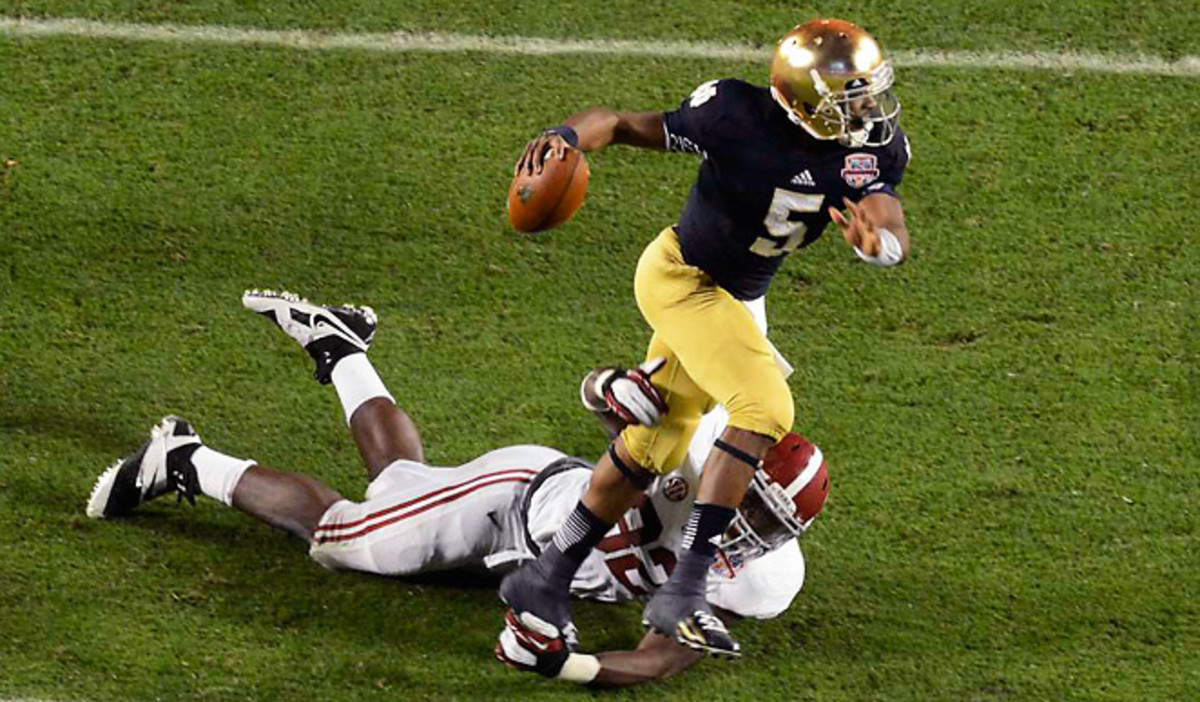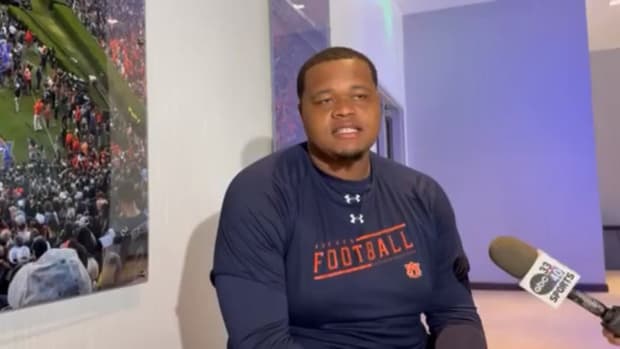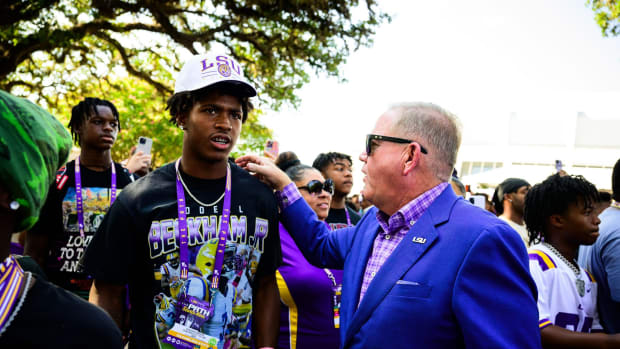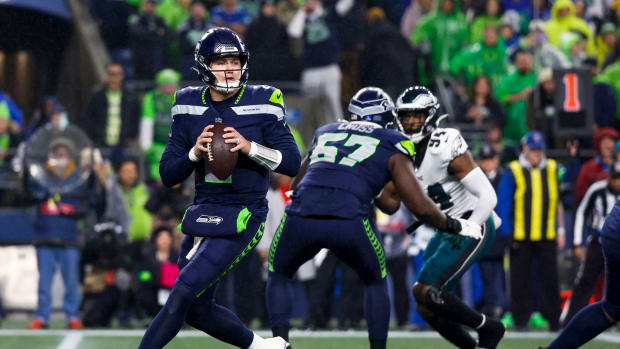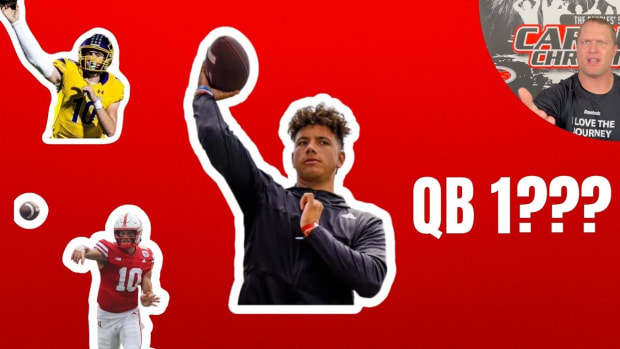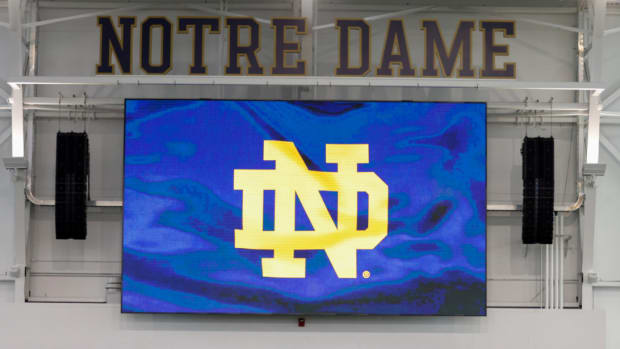What BCS loss means for Irish in 2013; more Mailbag
Note: Chip Kelly left Oregon for the NFL after I filed this Mailbag. Here's my take on what's next for the Ducks.
By now you've read and heard just about everything there is to read and hear about Alabama after the Tide's latest national championship. And you're going to hear a whole lot more Roll Tide in the buildup to next season -- starting later in this column.
But what about the team Alabama obliterated on Jan. 7 in Miami? Will the Fighting Irish field a football team in 2013? If so, who will be the coach? (Oh right, we found that out last weekend.) And should we preemptively ban Notre Dame from next year's championship game to avoid further humiliation?
These are the types of questions they're asking in Alabama. As for the rest of us ...
How much did Notre Dame's performance in the national championship game affect its chances to make next year's game? If the Irish were to go undefeated next year, would a one-loss conference champion out of any of the BCS conferences get the nod over ND based on the country not wanting another potential blowout?--Mike, Orlando
Notre Dame, welcome to Ohio State's world circa 2007. It doesn't matter that you won your first 12 games. If you get blown out by an SEC team in the title game, all of your prior results become invalid and you lose the benefit of the doubt. It's harsh, but true. And that's unfortunate for Notre Dame, because despite having to replace several key veterans (Manti Te'o, Tyler Eifert, Theo Riddick, Zeke Motta), the Irish should be better in 2013. They're certainly getting more talented as Brian Kelly's recruiting classes matriculate and gain experience. His incoming class is currently ranked second nationally by Rivals.com. But because Alabama looked so physically superior to Notre Dame, much of the public will automatically dismiss the Irish before they even take a snap.
We know this because the same thing happened to previously undefeated Ohio State after its 41-14 rout against Florida in the 2006 title game. The Buckeyes became the most loathed team in the country the following season for having the audacity to remain in national championship contention. As you may recall, 2007 was the Year of the Upset. Ohio State, which started 10-0, moved to No. 1 only after everybody else lost, but even then people were ticked. After Illinois upset the Buckeyes in mid-November, it appeared the issue was moot, but then everyone else lost a second time, and Ohio State moved back into the top two. The reaction was apoplectic. Ultimately LSU beat Ohio State in New Orleans, and all the Buckeyes bashers got their validation. But a year later, the 2006 Florida game really should not have been a factor in the 2007 national title race.
I'm not saying Notre Dame will go 12-0 or even 11-1 again next year, but if the Irish start, say, 7-0, against another respectable schedule, they will absolutely deserve to rise to the top of the pack, and if they do, the backlash will be overwhelming -- all because of a game played the previous season. Note: This only happens in college football. In any other sport, if there's a blowout in the championship game, it's a credit to the victor. In college football, because of the subjectivity and small sample size, a blowout becomes an indictment of the loser's entire existence. The Irish would have been better off in 2013 if they'd dropped a regular-season game and let someone else suffer the indignity of losing to Alabama. But ultimately, I don't think the people who actually cast votes will hold the previous year against the Irish nearly as much as the general public will. If the only teams allowed in the title game are those that previously demonstrated they can compete with Alabama, we'd have an all-SEC championship game every year. And that would generate a whole other level of backlash.
After such a quick ascendency, and then the terrible beatdown by 'Bama, how can anyone with intellectual honesty place Notre Dame in the preseason Top 10? Top 20?-- Pearce, Baton Rouge, La.
And so it begins.
Stewart, what is really amazing to me is how people always say the offensive and defensive lines win championships, but how quickly that gets thrown out the window when discussing future success. As in, "Texas A&M and Alabama just have to replace a few first round draft picks on the O-line, but they will be the top two teams in the country next year." Johnny Manziel will probably struggle more next year, not due to a Heisman jinx, but because this year he played behind one of the best O-lines in the country. I bet one would be more accurate in projecting next year's success if the total number of starts for the remaining offensive and defensive line players was used as the metric.-- Ben Caire, Golden, Colo.
Without question, an inexperienced offensive line -- even more so than an inexperienced quarterback -- has long been the downfall of otherwise promising teams. Georgia, with Matthew Stafford and Knowshon Moreno coming back, was anointed preseason No. 1 by many in 2008 despite having to rely on three freshmen or sophomore offensive linemen. Then-upstart Alabama mauled those guys in a late-September upset, and Georgia wound up losing three games. Oklahoma, returning Heisman winner Sam Bradford, began No. 3 in 2009, despite losing four starting O-linemen. In the opener against BYU, the Sooners couldn't remotely protect Bradford, who injured his shoulder, and the O-line struggled throughout an 8-5 season. And while most would agree defense was the biggest problem for 2012 preseason No. 1 USC, the offense never reached its full potential after losing star left tackle Matt Kalil to the NFL and briefly losing center Khaled Holmes to injury.
Manziel definitely benefited from playing behind the best pair of tackles in the country, Luke Joeckel and Jake Matthews. A lot of Manziel's big scrambles in the Cotton Bowl came not because his protection broke down but because he had forever to stand back and decide whether to throw or take off. Losing Joeckel will hurt, but Matthews' return softens the blow. Alabama, on the other hand, will be an interesting test case. The Tide will be the runaway preseason No. 1, and with the likes of AJ McCarron, T.J. Yeldon, Amari Cooper and C.J. Mosley returning, it's hard to argue otherwise. But Alabama must replace three standout offensive linemen -- Barrett Jones, Chance Warmack and D.J. Fluker -- who combined for a staggering 126 career starts. The Tide still have at least one more future first-rounder returning in Cyrus Kouandjio, and Nick Saban's track record of reloading is unmatched. But if the Tide take a step back next year, chances are high that O-line struggles will be the reason.
Stewart, I have two questions about two coaches. First, Bill Snyder said that he would retire from his second go-round with Kansas State after he felt like he had righted the ship; has he given any indication that he thinks that goal has been accomplished? Second, what would you say is the over/under on games lost by USC next season and Lane Kiffin being out of a job?-- Doug, St. Louis
Here are two succinct answers to two interesting questions.
I'm sure Snyder meant that when he returned, but it sure seems like he's fully immersed himself back into coaching. If the goal was to get K-State back to its previous perch, mission achieved -- but he's shown no sign of re-retiring. And who knows with USC? On the one hand, it would seem the Trojans can only trend further down with the scholarship reductions kicking in. On the other hand, they should bring back 15 starters, including star receiver Marqise Lee, tailback Silas Redd and pass-rusher Morgan Breslin, and it's no tall order to improve on 7-6. On the one hand, Kiffin's now had four years as a college head coach and seems no closer to showing he knows what he's doing. On the other hand, he did win 10 games two years ago, and many believe loyalty to his father Monte, now with the Dallas Cowboys, was one of his biggest problems. I can't begin to predict his fate, only that he'll surely generate more unwanted headlines.
Hey Stewart, don't forget that in 1993 No. 2 Nebraska lost to No. 1 Florida State in the Orange Bowl 18-16 on a last second missed field goal that would have won the national title. That would put Nebraska's five-year record at 60-3. I think that is more impressive than ama's current run.--Dillon, South Sioux City, Nebraska
Nope, Bama's run is better than Nebraska's because they've had to play a conference championship.-- Michael Ashley, Seattle
I received quite a few persuasive e-mails on one side or the other regarding the Nebraska 1994-97 vs. Alabama 2009-12 debate (mostly from Nebraska fans). The two replies displayed above demonstrate a major reason why it's so hard to compare teams from two different eras. To Dillon's point, yes, adding that extra year makes the Huskers' run even more impressive. But if we tack on 2008 for Alabama, the Tide finished the regular season 12-0 and ranked No. 1 that year before losing to No. 2 Florida in a close SEC championship game. So that's essentially a wash.
But Michael's point isn't perfect, either. For one thing, Nebraska did play in the first two Big 12 title games during that five-year run. Alabama has played in three SEC title games over its five-year run, since it didn't reach the game in 2011. So that's not a big difference. And besides, at least in the Big 8 the Huskers played a round-robin schedule. It's actually an argument against Alabama that it's played in a larger conference and thus, in the case of 2012, avoided playing top 10 conference members Florida and South Carolina. Even so, as noted last week, the Tide still beat more ranked conference foes than the Huskers. For that and all the other previously stated reasons, I'm sticking with 'Bama.
(On a side note, the most fascinating aspect of the 1994 Orange Bowl wasn't the result but the fact that O.J. Simpson was the sideline reporter.)
As a Husker fan, I think you're completely wrong about Alabama's current run being more impressive than the Tommy Frazier era. Alabama lost two games in November the last two years -- at home. They needed Stanford and Baylor this year; Nebraska didn't even need the forward pass.--Dave, Hangzhou, China
That last line is the most persuasive yet.
Stewart, I read your article on declining bowl attendance and it brings me back to my first thoughts about using these bowls as playoff semifinal sites. How many fan bases can actually support traveling to two bowl games even if one of them is the championship game? I would think most people would choose to watch the semifinal game from home and hope to make a trip to the championship game. Am I completely wrong about that? Are these bowls not at all worried about selling seats and hotel rooms for a semifinal game?-- Parker, New Orleans
They're absolutely concerned about it. So are the commissioners. I don't think many fans will actually travel to both games. That would require some serious dough, a lot of babysitters and a very flexible work schedule. The question is, do organizers actually need the same set of people to travel to both sites in order to sell them out? Not necessarily.
For one thing, spreading out demand over two trips may actually allow more fans to travel. For the past several years, ticket demand for the BCS championship game has far exceeded supply. Notre Dame received more than 100,000 ticket requests for this year's game. StubHub had to shut down sales to the Auburn-Oregon game two years ago because it couldn't keep up with the orders. Whereas about 40,000 Alabama fans were able to attend this year's championship, theoretically 80,000 could attend the playoff. It's possible, as Parker suggests, that fans will put all their eggs into reaching the championship game, leaving the semifinal bowls with thousands of empty seats. But it could also trend in the other direction. The bowls will still be the ones played during the holidays (Dec. 31 or Jan. 1), with a month's advance notice, whereas the championship game will be played on a Monday the second week of January (the first one is Jan. 12). It may be more realistic to attend the semis than the title game.
And it may be that local interest in the playoff is so high that organizers don't even need traveling fans to fill the stadiums. In that respect it would not be much different than the Super Bowl, in which only a small section of the crowd is actually fans from the participating teams' cities. The downside, of course, is that makes for a very sterile atmosphere. The championship game would be fine if this happens, but the host bowls, which ostensibly promote tourism in their cities, would not be pleased.
Lost in the hysteria of yet another Alabama-SEC national championship: I doubt very much this is the game we would've seen, or that an SEC team would've even been playing in it, had Ohio State not been banned from the postseason. Is it sweet irony that the SEC owes its continued dominance and Alabama a historical three championships in four years to the Big Ten?-- Karl, Chicago
It is indeed ironic that the Big Ten -- which lords its purported ethical superiority over the SEC (cough oversigning, cough) as the reason we should discount Alabama's and the SEC's accomplishments -- missed its chance to end the SEC's dominance because of an unethical coach.
I'm curious to hear your perspective on Aaron Murray's decision to return, and what you foresee his ultimate legacy to be. As a diehard Georgia fan, I think he remains underrated and love watching him play. Barring injury, he should shatter every career passing record in the SEC, and there have been a few good QBs to come through the conference. That said, absent an SEC championship, I think he's destined to remain underappreciated.-- Andrew G., Denver
I was quite surprised when Murray announced he was returning. I'd always thought of him as a surefire three-and-out NFL guy. Apparently the NFL was not as high on him as many assumed. Perhaps GMs have the same reservations that cause this lack of appreciation Andrew speaks of. No question, the Georgia quarterback has put up great statistics in three years as a starter: 10,091 yards, with 95 touchdowns against 32 interceptions. But school and conference passing records fall by the year these days in a more wide-open sport, and in turn, stats alone can't possibly define a player's legacy. If they did, Landry Jones would be considered the greatest quarterback in Oklahoma history.
Barring injuries, Murray should wind up claiming that title at Georgia, but in terms of SEC or national legacy, he's got to win something more important than the Capital One Bowl. Just among his conference contemporaries alone, he's played against a Heisman winner (Cam Newton) and a two-time national champion (AJ McCarron) and played in the same league as another Heisman winner (Johnny Manziel). Murray's biggest win to date was the 2012 Florida game, but he himself had a bad game (150 yards, three interceptions). His defining performance to date was a near-upset of Alabama in this year's SEC title game. He did finish as the nation's second-rated passer this season, and a similar showing next year would put him in select company. But he'd really set himself apart with a couple of big games in wins against upper-tier opponents. His first shot comes in the 2013 opener against Tajh Boyd-led Clemson.
Look at the Colley Matrix, one of the computer ratings used by the BCS. Notre Dame is still ranked No. 1.-- Dan, Morrison, Colo.
I smell a banner.
